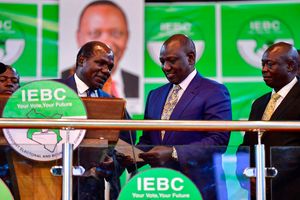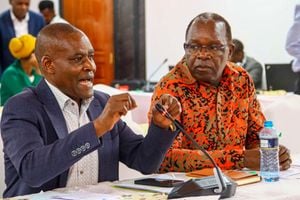
An Independent Election and Boundaries Commission (IEBC) official uses the Kems kit to read the fingerprints of a voter.
Allies of President William Ruto and Opposition leader Raila Odinga closed ranks in Parliament and agreed on a raft of changes to restructure the electoral agency in a proposed legislation.
The MPs are in support of the proposed amendments by the joint parliamentary committee of the Justice and Legal Affairs in regards to the Independent Electoral and Boundaries (Amendment) Bill, 2024.
The new commissioners that will be recruited by the yet to be appointed selection panel, will come into office with a raft of changes in the electoral body.
The changes adopted by the MPs include provisions that the next IEBC Chief Executive Officer (CEO) will now serve for a four-year term, which is renewable only once.
This was a climb down from an earlier proposal of putting the term of the CEO fixed at six years non-renewable.
Also passed by the MPs during the committee of the whole House is the requirement that the next commissioners must have proven experience on either Information Communication and Technology (ICT) and accounting as additional qualifications for the job.
While adopting the new qualification, the lawmakers said the additional qualifications for the next cohort of the commissioners, will help in better management of the elections since the country’s polls are majorly driven by technology.
“The proposed additional experience in information and communication technology and accounting, accords with the various functions of the commission that includes the use of technology and the prudent procurement of goods and services related to the conduct of elections,” reads the Bill.
According to Section 6(2) of the IEBC Act, 2011, a person is qualified for appointment as a member of the Commission if such person holds a degree from a recognised university, has proven relevant experience in any of the following fields-electoral matters, management, finance, governance, public administration, law and meets the requirements of Chapter Six of the Constitution.
A proposal by Kinangop MP Zachary Kwenya to have the next chairperson of the commission to also have proven experience in either ICT, accounting, governance and public administration was dropped after the lawmaker had consultations with the leadership.
“We have had consultations and have agreed with the amendments as proposed by the joint Justice and Legal Affairs Committee. There were areas with minor errors that both coalitions have agreed to change,” National Assembly Minority Leader Opiyo Wandayi said.
The lawmakers also increased the period in which the next commission is expected to review the conduct of General elections and table a report in the National Assembly from the current 12 months to 18 months.
Some MPs however said the proposal as contained in Clause Six of the Bill is not explicit on what Parliament should do with the report, in case IEBC finds in their review that the elections had some anomalies.
“What next after the report is submitted to Parliament? The committee should have provided a way forward on what Parliament should do with the report,” said Funyula MP Wilberforce Oundo.
The committee chairman George Murugara however said they did not want to legislate for the House on what to do with the report once submitted by IEBC.
“We left it open so that the House can make its own decision on what to do with the report,” Mr Murugara said.
The next selection panel will also this time draw its funding from the Parliamentary Service Commission (PSC) after MPs adopted changes to Clause 8 of the Bill.
The current law left the funding of the panel open, hence it was not clear where the panel was getting money to run its activities and the same was raising eyebrows on the impartiality of the panel, as there was suspicion that it was being funded by the Executive.
“This panel would sit and do its activities and there would be questions on where it was getting its funding from,” said Dagoretti North MP Beatrice Elachi.
The seven members of the Electoral Commission Selection Panel led by Dr Nelson Makanda have also been disbanded as MPs adopted a proposal seeking to send them home.
“The panel...ceases to exist but a person who served as a member of that selection panel may be nominated to serve as a member of the selection panel appointed under this Act,” reads the Bill.
However, MPs yesterday encouraged the team in the panel to re-apply when the advertisement for recruitment for the new team will be put out.
“We have not sacked them, they are actually encouraged to apply to be in the next panel,” said Embakasi West MP Mark Mwenje.
The new look panel will have nine members from the current seven, after MPs adopted a proposal to increase nominees of the Political Parties Liaison Committee from the current one to three.
The Bill now heads to the Senate for consideration. The opposition has called for electoral justice and also an audit of the 2022 presidential polls.










